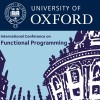Abstracting Definitional Interpreters
In this functional pearl, we examine the use of definitional interpreters as a basis for abstract interpretation of higher-order programming languages. As it turns out, definitional interpreters, especially those written in monadic style, can provide a nice basis for a wide variety of collecting semantics, abstract interpretations, symbolic executions, and their intermixings.
But the real insight of this story is a replaying of an insight from Reynold's landmark paper, Definitional Interpreters for Higher-Order Programming Languages, in which he observes definitional interpreters enable the defined-language to inherit properties of the defining-language. We show the same holds true for definitional abstract interpreters. Remarkably, we observe that abstract definitional interpreters can inherit the so-called 'pushdown control flow' property, wherein function calls and returns are precisely matched in the abstract semantics, simply by virtue of the function call mechanism of the defining-language.
The first approaches to achieve this property for higher-order languages appeared within the last ten years, and have since been the subject of many papers. These approaches start from a state-machine semantics and uniformly involve significant technical engineering to recover the precision of pushdown control flow. In contrast, starting from a definitional interpreter, the pushdown control flow property is inherent in the meta-language and requires no further technical mechanism to achieve.




